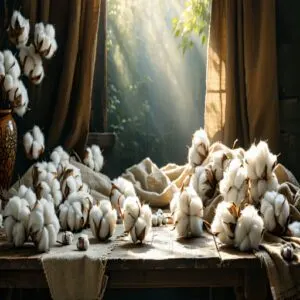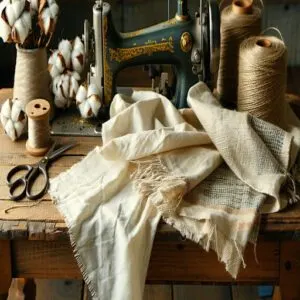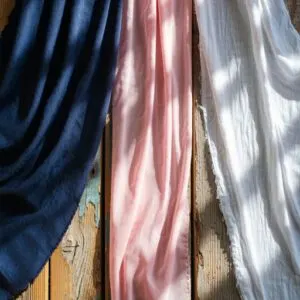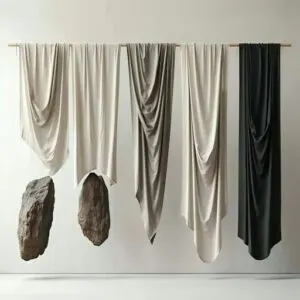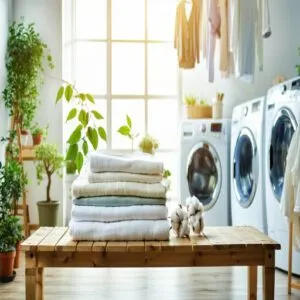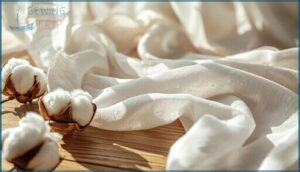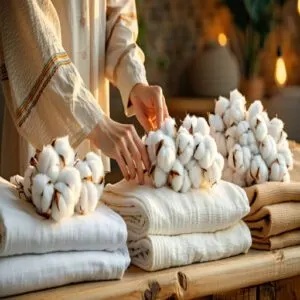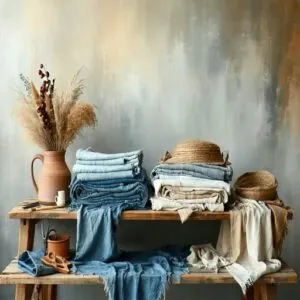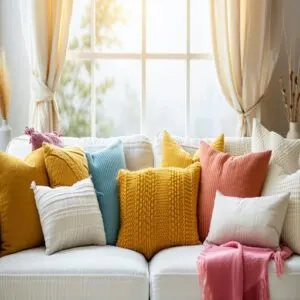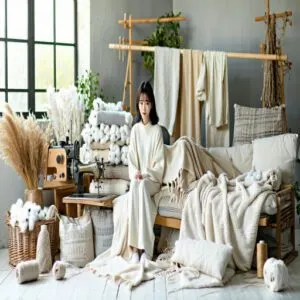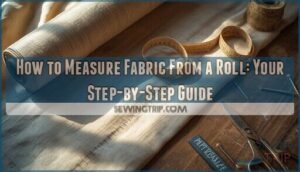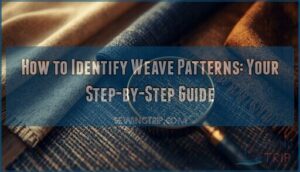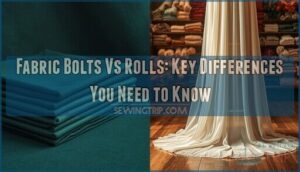This site is supported by our readers. We may earn a commission, at no cost to you, if you purchase through links.
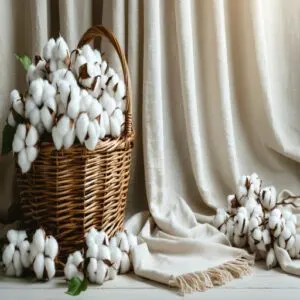
For eco-friendly vibes, organic cotton is your go-to, offering sustainability and hypoallergenic benefits.
Craving luxury? Egyptian cotton’s unmatched softness and durability deliver. Pima cotton is buttery soft, while Supima cotton adds extra durability for long-lasting comfort.
Cotton’s natural breathability and moisture-wicking make it ideal for clothes, while heavier options like canvas handle bags and décor with ease.
Whether you’re dressing up or decorating your home, cotton fabrics bring comfort, style, and practicality. Caring for them? It’s easier than you think—stay tuned.
Table Of Contents
Key Takeaways
- You’ll love organic cotton for its eco-friendliness, sustainability, and hypoallergenic benefits, making it perfect for sensitive skin.
- Egyptian, Pima, and Supima cotton deliver luxurious softness, exceptional durability, and long-lasting comfort for bedding and high-end clothing.
- Choosing cotton fabrics means balancing thread count, weave type, and fabric weight to match your needs for breathability, softness, or durability.
- Proper care like cold water washing, mild detergents, and careful storage will keep your cotton fabrics fresh and long-lasting.
Cotton Fabric Types
In the context of cotton fabrics, there’s a wide variety to choose from, each with its own unique qualities.
From soft organic cotton to luxurious Egyptian cotton, understanding these types helps you pick the right fabric for your needs.
Organic Cotton Benefits
Looking for eco-friendly and chemical-free cotton fabric choices?
Organic cotton’s benefits are hard to beat, made through sustainable farming, it’s a green textile option that’s soft, durable, and hypoallergenic—perfect for sensitive skin.
Natural fibers make it breathable and ideal for everyday wear, choosing organic cotton fabric means supporting organic farming while enjoying comfort and style wrapped in sustainability.
When selecting the best fabric, consider visiting a cotton fabric guide to learn more about the different types and their uses.
Egyptian Cotton Quality
In the context of superior cotton fabric quality, Egyptian cotton stands out.
Its long fibers boost durability and fabric softness, while the hand-picking process preserves fiber strength.
Combined with high weave density and exceptional yarn quality, this cotton delivers unmatched luxury.
Egyptian cotton characteristics like breathability and moisture-wicking guarantee year-round comfort, making it a worthwhile investment for premium bedding and apparel.
Understanding the cotton quality difference is essential for making informed decisions about cotton products.
Pima Cotton Softness
Egyptian cotton’s luxury has its match in Pima cotton’s softness.
Known for its long fibers, Pima cotton offers unmatched cotton fabric softness and smooth texture.
It resists pilling, keeping that polished look intact.
The fabric feel is luxurious yet practical, perfect for everyday comfort.
Choose Pima quality for bedding or clothing when cotton comfort is your priority.
Pima cotton’s exceptional durability and softness can be attributed to its extra long fibers, making it a popular choice for high-end clothing and luxury bedding.
Supima Cotton Durability
Supima cotton stands out for its unmatched strength and fiber longevity.
Its yarn quality guarantees cotton fabric durability that resists pilling and stays smooth.
Here’s why it’s worth considering:
- Unbeatable Durability: Twice as strong as regular cotton.
- Long-Lasting Fabric Resistance: Frequent washing won’t ruin it.
- Vibrant Textile Performance: Colors stay fresh.
- Luxurious Supima Cotton Quality: Comfort meets resilience.
Choosing Cotton Fabric
Choosing the right cotton fabric means thinking about how it feels, looks, and holds up over time.
Whether you’re after softness, style, or durability, matching the fabric to your needs makes all the difference.
Thread Count Importance
Every cotton fabric feels different, and thread count is a key factor.
A higher thread count usually means smoother, denser fabric, but don’t fall for extreme counts—they’re not magic.
Quality threads, balanced weave patterns, and proper yarn thickness also matter.
Proper thread selection for fabrics is essential for project success.
Even lower thread counts can shine with good fibers.
It’s about what feels right, not just numbers, and considering the quality threads is crucial for the overall feel of the fabric.
Weave and Texture Options
Not all cotton weaves are created equal, so understanding weave patterns helps you pick wisely.
For texture analysis, consider:
- Twill Cotton: Durable with a diagonal pattern, great for sturdy items like pants.
- Sateen Cotton: Silky fabric smoothness, ideal for luxurious bedding.
- Cotton Voile: Lightweight cotton fabric textures, perfect for breezy clothes.
When shopping for cotton fabric products, it’s vital that you keep in mind the specific needs of your project.
Fabric density affects durability and feel, so pick smart!
Color and Pattern Selection
In 2025, bold pattern mixing takes center stage, with asymmetrical designs adding modern flair to classic styles.
You’ll find vibrant textile dyeing techniques creating stunning cotton fabric prints, from colorful stripes to photographic florals.
For shade selection, consider nature-inspired color trends that blend earthy tones with hyper-color motifs.
When choosing cotton fabric patterns, mix smooth textures with striking prints for visual appeal.
Fabric Weight and Thickness
When selecting fabric weight and thickness, you’ll need to match your project’s requirements.
Lighter cotton fabrics work well for summer clothes, while heavier options suit winter wear and home decor.
Thread thickness and weave tightness affect both durability and drape.
- Lightweight cotton (2-4 oz/yd²) – Perfect for blouses and lingerie
- Medium cotton (4-7 oz/yd²) – Ideal for shirts and dresses
- Medium-heavy (7-11 oz/yd²) – Great for pants and jackets
- Heavy cotton (11-14 oz/yd²) – Best for upholstery and bags
- Super heavy (14+ oz/yd²) – Suited for canvas and industrial use
Cotton Care and Maintenance
You’ll discover that caring for your cotton fabrics isn’t as tricky as you might think, with simple steps to keep them looking fresh and lasting longer.
Whether you’re dealing with stubborn stains or want to prevent shrinkage, we’ll show you the easiest ways to wash, dry, and store your cotton items properly.
Washing and Drying Tips
Smart cotton fabric care begins with cold water washing to prevent fabric shrinkage and preserve colors.
Use mild detergents for ideal fabric softening, and always separate lights from darks to avoid color fading.
For drying methods, choose between line-drying (best for shape retention) or tumble dry on low.
When wet, gently reshape garments before drying to maintain their form.
Understanding cotton fabric wash techniques is essential for extending the life of your cotton garments.
Ironing Recommendations
When tackling fabric wrinkles, set your iron temperature between 350°F to 400°F for ideal cotton smoothing.
You’ll get the best pressing techniques by using steam ironing while the fabric is slightly damp.
Move in straight, smooth strokes for effective cotton fabric care.
If you’re unsure about iron temperature, start lower and gradually increase it to prevent cotton shrinkage.
Always check the garment’s care label first.
Storing Cotton Garments
A well-organized closet is your cotton’s best friend.
Store garments in breathable cotton muslin bags rather than plastic, which can trap harmful moisture.
Keep your closet cool and dry, maintaining humidity levels between 40-50% .
To prevent fabric damage, learn more about storing fabric correctly.
Add cedar blocks or lavender sachets to naturally protect against pests while controlling moisture.
For bulky items, use acid-free boxes with proper folding techniques.
Removing Stains and Spills
When spills happen, quick spill response makes all the difference.
Start with spot cleaning – blot the area immediately with a clean cloth, never rub.
For tough cotton fabric stains, pre-treat using white vinegar and cold water, letting it sit for 15 minutes.
Natural stain removal tips include using lemon juice for gentle cotton fabric care.
For grease stains, dish soap works wonders.
Cotton Fabric Characteristics
You’ll find that cotton fabric offers natural comfort with its remarkable mix of breathability, softness, and strength that makes it perfect for everyday wear.
Your cotton garments will keep you cool and comfortable while lasting through countless washes, thanks to cotton’s natural ability to handle moisture and maintain its shape, which is a key factor in its natural comfort.
Breathability and Moisture Wicking
Your workout gear’s breathability can make the difference between comfort and discomfort.
Scientific research shows that cotton’s porous structure naturally promotes air circulation and fabric ventilation.
The weave pattern plays a significant role in moisture management, with lighter, looser weaves offering superior thermal regulation.
- Envision microscopic air channels creating a natural cooling system
- Picture moisture moving through cotton’s diamond-shaped structure
- Visualize sweat evaporating through breathable cotton layers
- Think of air flowing freely through lightweight voile cotton weaves
Softness and Comfort
Instantly, you’ll notice the remarkable sensory experience when premium cotton touches your skin.
The fabric feel varies substantially among different cotton types, each offering unique comfort levels.
| Cotton Type | Fabric Feel | Comfort Features | Best For |
|---|---|---|---|
| Supima | Ultra-Silky | Luxurious Touch | High-end Wear |
| Pima | Premium | Smooth, No Pilling | Daily Comfort |
| Egyptian | Luxurious | Extra-long Fibers | Luxury Items |
| Standard | Soft | Basic Comfort | Everyday Use |
Your choice in soft textures affects the hypoallergenic and breathability qualities you’ll experience.
Durability and Longevity
Striking a balance between softness and durability, cotton fabric durability relies on fiber strength, textile endurance, and quality details like thread count and cotton fabric weights.
Denim durability shows how proper design extends fabric lifespan, resisting daily wear, while long-staple cotton guarantees better wear resistance.
Twill cotton durability is perfect for demanding tasks, and strong fibers build lasting, reliable cotton longevity.
Hypoallergenic Properties
If you’ve got sensitive skin, you’ll want cotton fabrics on your team.
Thanks to the natural fibers and hypoallergenic cotton fabric properties, they’re gentle on skin and great for allergy prevention.
Organic cotton fabric takes it up a notch, offering skin safety without harsh chemicals.
These cotton fabric characteristics guarantee comfort and care, making them perfect for everyone.
Cotton Fabric Applications
You’d be surprised how many ways cotton fabric can make your life easier and more comfortable.
From cozy t-shirts and soft bedsheets to sturdy industrial materials and eco-friendly options, cotton is everywhere, helping you every day.
Clothing and Apparel
In the field of fashion trends and apparel design, cotton fabric types like jersey cotton or organic cotton fabric are a game-changer.
They’re breathable, comfy, and perfect for every season.
With excellent cotton fabric properties such as softness and durability, they suit all garment construction needs, from casual T-shirts to custom outfits.
Ready for style advice? Choose wisely!
Home Textiles and Decor
Transforming your home’s style with cotton fabric is simple and satisfying.
It’s breathable, durable, and blends beautifully with decor.
Here are three ideas:
- Curtain Materials: Opt for light cotton to brighten your space.
- Bedding Options: Choose soft, long-staple cotton for cozy, luxurious comfort.
- Table Runners & Wall Hangings: Add personality with patterned canvas cotton.
Cotton’s versatility shines everywhere.
For a cohesive look, consider cotton home decor options that complement your fabric choices.
Industrial and Medical Uses
Cotton proves its worth in medical and industrial applications.
From surgical gowns to hospital linens, it’s reliable and breathable.
Cotton bandages and medical uses like swabs highlight its gentle touch.
For industrial uses, cotton shines in filters and heavy-duty textiles.
Durable cotton blends, like cotton-polyester, extend life and performance, making them indispensable in both critical and everyday settings.
The choice of cotton is often influenced by its cotton fabric properties, which include softness, breathability, and moisture-wicking capabilities.
| Application | Purpose | Example |
|---|---|---|
| Medical Textiles | Hygiene and safety | Surgical gowns, hospital linens |
| Cotton Bandages | Wound care | Swabs, dressings |
| Industrial Filters | Strength and durability | Conveyor belts, air filters |
Sustainable and Eco-Friendly Options
For a greener wardrobe, eco cotton options reduce environmental impact without cutting corners on quality.
Sustainable farming and organic materials, like organic cotton, offer ecofriendly cotton alternatives that benefit you and the planet.
- Organic cotton: Grown without harmful chemicals.
- Recycled cotton: Reduces textile waste.
- Hemp and linen: Durable, low-impact fibers.
- Bamboo fabrics: Renewable and soft.
Look for certifications verifying sustainability.
Frequently Asked Questions (FAQs)
What are the benefits of cotton-polyester blends?
Packed with practical perks, cotton-polyester blends deliver durability, wrinkle resistance, and quick-drying convenience.
You get the softness of cotton paired with polyester’s strength, making it perfect for comfy clothes that last longer and need less fuss, which ultimately provides wrinkle resistance.
How does cotton compare to synthetic fabrics?
You’ll love cotton’s softness and breathability, but synthetic fabrics often win with wrinkle resistance, quicker drying, and stretch.
While synthetics handle workouts, weather, and activewear better, cotton’s natural feel shines.
Choose what fits your lifestyle!
Is cotton suitable for outdoor gear and clothing?
Over 70% of outdoor enthusiasts prefer breathable materials.
While it’s soft and comfy, cotton absorbs moisture, making it less ideal for wet conditions.
Opt for cotton blends to boost performance outdoors, as cotton is a mixed bag.
What are common misconceptions about cotton fabrics?
You might think all cotton feels the same, but that’s way off.
High thread counts aren’t always better, organic cotton doesn’t mean rough textures, and cotton isn’t automatically wrinkle-free or fade-proof.
It depends!
How is recycled cotton fabric produced?
You take leftover cotton scraps from factories or old garments, shred them into fibers, and spin them into new yarn.
By reusing what’s already there, recycled cotton slashes waste and gives old materials new life.
Conclusion
From everyday clothes to luxury bedding, cotton fabric choices balance comfort with practicality.
Whether you’re drawn to the eco-friendliness of organic cotton, the unmatched durability of Supima, or the silky softness of Egyptian, there’s a perfect fit for your needs.
Don’t forget to take into account thread count, weave, and weight when shopping.
Plus, with proper care, cotton’s breathability and durability make it an investment that lasts.
Choose wisely, and your cotton will keep delivering for years.
- https://cariki.co.uk/blogs/the-green-road/what-is-cotton-characteristics-and-properties
- https://sewport.com/fabrics-directory/cotton-fabric
- https://www.onlineclothingstudy.com/2021/01/various-uses-of-cotton-fibres.html
- https://recovo.co/blog/organic-cotton-what-it-is-uses-benefits-and-more/
- https://blog.spoonflower.com/2021/05/07/choosing-cotton-fabric/

